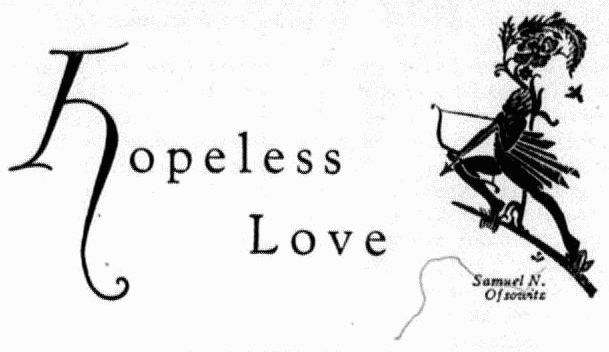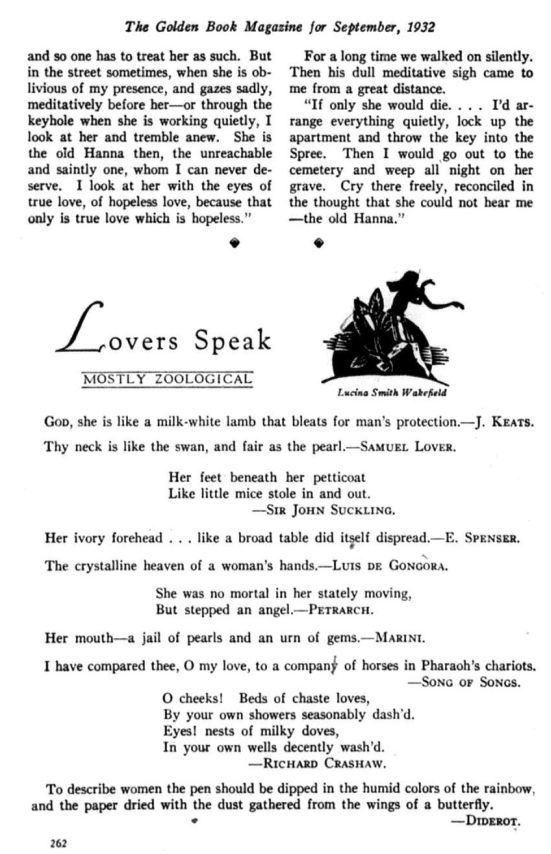

One autumn day, after an absence of eight years, I returned to Berlin, where I had spent two of the best and saddest years of my life. It was a business trip, and I had spent my time on the train in studying the pressing affairs I had on hand, and in reading an interesting treatise. It was not until I descended the staircase of the Friedrichstrasse station that I was overcome by deep and painful sentiment—sentiment that I did not shake off at any time during the three days I spent in Berlin.
Since I am no longer a poet, I can safely say that in those three days I was not living in the present, but in the memory of those two years. I was lost again in those sorrows of which I am now free, and which, I discovered, had contained all that was blazingly, gloriously beautiful in life.
The emotions no longer really existed in my breast, yet I found myself walking aimlessly along the Friedrichstrasse trying to relive the happenings of those days when they were alive in my heart, in order to revive their trivial but poignant reality.
Here was the cafe where I had so often sat waiting. . . . In this post-office I posted those many letters, and nicer ones I have never written. . . .
At last I arrived in the vicinity of the Leasing Theater, and yes, there behind the window of a café, I suddenly saw Felix Stahl.
I must unconsciously have been looking for him, for it was exactly the same café and table where he had sat day after day eight years before. What had happened to Felix Stahl since we parted, I did not know. When I had thought of him I had imagined him dead, or in Africa, or in a monastery. The solid and suppressed force of life, of dark, tearing, miserable and unconscious desire, affection and ecstasy which had dwelt in Felix Stahl, one could not imagine in connection with the commonplace passing of years.
And yet—Felix Stahl was there, and with him were two unforgettable years of my life—the long burning walks together in the early dawn, the intimate silences, the endless nervous laughter over the wild images which we carved of air. It was easier to forget that eight years had passed since I had seen him, than that Felix Stahl had lived through the three thousand intervening days and nights without burning up the world like a cinder thrown into a dry forest.
His face lit up when I sat down beside him, and we began immediately to talk. He had not changed much. Time seemed only to have accentuated the lines and furrows of his passionate, almost maniacal features.
We spoke lightly at first, but intimately and with suppressed joy. I felt that he also had not found anybody to whom he could talk freely in the last eight years. This was surely the old harmony, the old friendship. We discussed what we had done in our professions; we discussed our advancing years and our contemporaries; we laughed exorbitantly over the apt remarks with which we hit off a self-important celebrity or stupid institution. I noticed that he was looking at his watch repeatedly. . . .
It was at this moment that I really recognized the Felix of old. Memory flooded back. . . .
“You have to go? . . .” I asked.
He looked at me, and tried to answer lightly, but no words came. An infinite feeling of compassion and envy overwhelmed me simultaneously. He sat gazing before him, looking miserable.
“She is still in town?”
He nodded.
“You still sit here because of her? Where is she playing?”
“At the Leasing Theater.”
I looked at my watch.
“We still have a quarter of an hour before the theater will be out. You are going to the stage door?"
He acquiesced. The questions I had asked had not told me in any way how their romance had progressed. I only knew that his passion was at exactly the same state as when he had first seen her. . . . This passion—the beauty, the flaming, the misery, the shamefulness of which no man has ever equaled and survived. It was somehow natural to see him here and to know that there was nothing else for him in all the world—no time and no space, only Hanna, her sickly, pale hands bathed in men’s tears, her incomprehensibly beautiful head and the rustling of her skirts. It was somehow natural that he had sat here through the passing years, waiting for a fleeting glimpse of her, or gazing at the street through which she had passed, or at the face of the messenger boy at the corner, upon whom her eyes may have rested.
In fact, Felix seemed to have been born because, somewhere in the darkness of non-existence he had sensed Hannaʼs perfume, and had hoped that at sometime, maybe but once only, he might kiss the hem of her skirt.
“Have you spoken to her yet?”
He nodded, but I noticed that my question irritated him. To my further questions about his relations with Hanna he gave short, dry answers, or none at all. Nevertheless, I found out that Hanna had at one time consented to leave her husband and to go to Rome with him. I was overwhelmed.
“So you got as far as that? Did she really consent to elope with you?”
He nodded briefly.
“But what happened?”
I saw that he was going through tortures in talking about it.
“We arranged to meet at the station at noon,” he began. Suddenly he jumped up. It seemed as if he could not bear to think about it.
“What time is it?” he asked.
I also stood up. I wanted to know the end of the story. I looked at him questioningly. He blushed.
“It’s time to go.”
We paid our bill and hurried to the theater under the hysterical flare of the unfriendly gas-jets. They were already coming out: automobiles and carriages clamored at the door and the lights gleamed on rich satins and furs. He saw her first. He did not speak, only stopped and gripped my arm. His face was deathly.
Twenty feet away, wrapped in a black lace evening wrap, Hanna was hurrying gracefully toward a car. Her unchanged beauty was like a shoreless island, unfit for landing and holding throbbing life at a distance.
Felix Stahl watched her, immobile. I grabbed his arm excitedly.
“Come on,” I said. “Don’t be so slow. Let’s go and speak to her. Perhaps she will remember me. Don’t you want to talk to her? Don’t you want her to see that you are here?”
He shook his head, and silently held me back when I would have pushed nearer. Then he smiled, his face transfigured with happiness, and murmured:
“Why should she see me? Isnʼt it enough to see her just as she is? Look, we are walking just where she has passed. Look . . . look how her cloak floats about her. She is unreachable.”
He looked at me exultantly, tremblingly.
“If she wanted me to die immediately. . . . If she asked me to . . . if she would permit it . . .”
I lost my temper.
“She is leaving, you fool. She’s already started.”
He held me back, gently and calmly. “I love her to distraction,” he said simply.
For five minutes we walked along in silence. When we reached the boulevard, I glanced stealthily at him. He was calm and cheerful. He even yawned.
“Where are you staying?” he asked in an entirely new and matter-of-fact tone. I answered and suggested that we have supper together there.
“All right,” he agreed. “We’re not far from my flat. I rented a place near the newspaper office so that I could drop down there at any time . . .” And he went on to tell me more about his work as editor of a well-known daily.
Soon he halted in front of a nice new building, and pulled out a key.
“Come up for a minute, and then Iʼll go with you wherever you wish. Iʼll just tell my wife that I am going out.”
While I, in amazement, sought for words, he conducted me into the hall of a beautiful modern apartment.
Felix called out, his voice suddenly cold and stiff. “Don’t let me disturb you, my dear. Are you dressing? I just wanted to tell you that I am going out for some supper.”
The door opened suddenly, and there, in a simple housedress, stood Hanna!
I do not remember what I stammered out. I awoke to hear Felix repeating something in a brusque, impatient tone, while Hanna stood silent, abashed and suffering.
“We must go now. I must also look in at the paper. Iʼll bring Aleck in tomorrow and you can have a chance to gossip together. Good-night.”
He was already out of the door and there was nothing to do but follow him, speechless with astonishment.
When we reached the street, he laughed at the sight of my face—but harshly and without mirth.
“I didnʼt say what happened at the railroad station. . . . She came. We left together. We have been married six years.”
I began to reproach him angrily for the stupid comedy he had enacted for my benefit in front of the theater, but he turned on me the old look of suffering and sadness. Then he said mournfully, turning to look back at the windows of the house we had quitted.
“I was not acting. I cannot tell her now how much I love her, because she is my wife. Now that we are together, I cannot call out to her ‘Hanna, I love you!’ as I could when she could not hear me. She is my wife and my servant, and so one has to treat her as such. But in the street sometimes, when she is oblivious of my presence, and gazes sadly, meditatively before her—or through the keyhole when she is working quietly, I look at her and tremble anew. She is the old Hanna then, the unreachable and saintly one, whom I can never deserve. I look at her with the eyes of true love, of hopeless love, because that only is true love which is hopeless.”
For along time we walked on silently. Then his dull meditative sigh came to me from a great distance.
“If only she would die. . . . Iʼd arrange everything quietly, lock up the apartment and throw the key into the Spree. Then I would go out to the cemetery and weep all night on her grave. Cry there freely, reconciled in the thought that she could not hear me—the old Hanna.”

SOURCE: Karinthy, Frigyes [Frederick]. “Hopeless Love,” translated by Paul Vajda, The Golden Book Magazine, vol. 16, no. 93, September 1932, pp. 259-262.
“The First Spear”
by Frigyes
[Frederick] Karinthy,
translated by Paul Vajda
Frigyes & Ferenc Karinthy in English
Frigyes (Frederiko) Karinthy (1887-1938) en Esperanto
The Cavalier & Related Pulp Magazines: Covers & Contents
Home
Page | Site Map | What's
New | Coming Attractions | Book
News
Bibliography | Mini-Bibliographies | Study
Guides | Special Sections
My Writings | Other Authors' Texts | Philosophical
Quotations
Blogs | Images
& Sounds | External Links
CONTACT Ralph Dumain
Uploaded 26 January 2022
Site ©1999-2022 Ralph Dumain